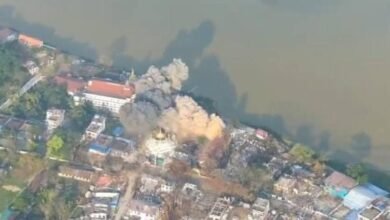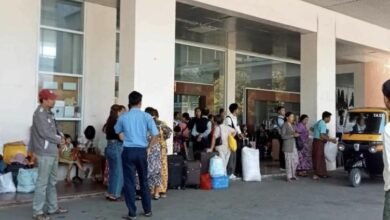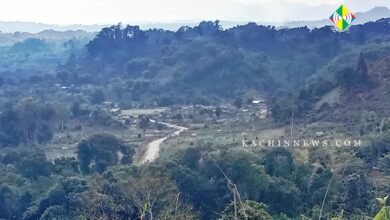Resistance Forces Launch Attacks Against Sagaing Govt Offices

Resistance forces have targeted government offices in Indaw Township five times in January and attacked offices in other townships in Sagaing Region in defiance of the regime’s plans to hold elections in August.
“They ignored the will of the people by trying to hold the general elections, so we attacked these offices because the polling organised by the military will be fraudulent,” a member of the Indaw People’s Defence Force told KNG.
On 17 January, an urban guerrilla unit attacked the Union Election Commission (UEC) office for Indaw Township with a grenade, after which the army shelled the area, injuring a child only 3 years old and a 30-year-old man.
According to the People’s Army to Fight Dictatorship (PAFD), the group attacked the immigration office in Myinmu on 19 January while staff were compiling voter lists there. The PAFD burnt important paper documents and computers.
On the same day, the All Burma Students’ Democratic Front and the local PDF set fire to the UEC office in Tamu Township.
PDF attacked the Monywa District Immigration Office in Nyaung Kai ward on 24 January.
In early January, a local PDF group attacked the immigration office for Myaung Township in a town of the same name.
One of the military regime’s newspapers reported that 13 UEC offices across the country were targeted by the armed groups, with most of the attacks in Sagaing and the second most in Magwe Region.
Since early January, authorities across the country have been collecting the names of eligible voters. The term of the State Administration Council, which was installed after the coup, will end on the 2nd anniversary of the coup on 1 February 2023 and the coup leader, Min Aung Laing, has expressed interest in becoming Burma’s next president, hoping to legitimise his government by allowing polling.
However, a Myaung PDF officer predicts that the regime will not be able to hold the ballot in Sagaing, as fighting in the area is certain to increase. “They’re only able to control the towns; they’re afraid to campaign in the villages.”




